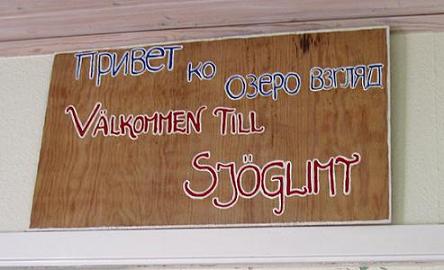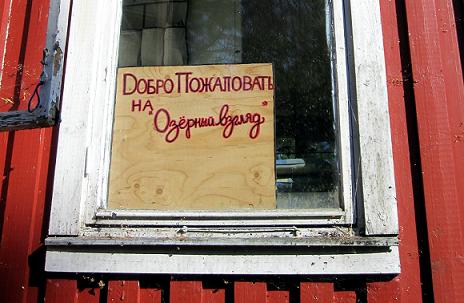It’s all about the Learning Process! Posted by josefina on Aug 8, 2009 in language
Always when I’m back home in Sweden and thus living outside of Russia, one and the same question is constantly on my mind: «Как изучать русский язык вне Российской федерации?» [How to study (learn; read; explore) Russian language outside of the Russian Federation?] The main point within this simple question could also be posed in many other ways, like for example: «Как учить русский язык вне России?» [How to learn Russian language outside of Russia?] or – this one is for the truly ambitious – «Как выучить русский язык, не будучи в России?» [How to learn (this perfect verb means that you reach a certain result, in languages it is almost synonym to becoming fluent) Russian language, not being in Russia?]. All of the questions above center on the largest problem for all people trying to learn a language without living in a country where it is spoken. If wake up one morning and find yourself living in «Петрозаводск» [Petrozavodsk], for example, you’re bound to be surrounded by it constantly and sooner or later forced to speak it – even if you’d rather not because «тебе стыдно за твой акцент» [you’re ashamed of your accent]. Learning Russian language if you are living, like I am right now as I’m writing this post, in a small red house somewhere deep in the Swedish woods without any Russians around to speak to for miles and miles – «это немножечко потрудней» [it’s a wee bit more difficult]. That, however, doesn’t mean that it can’t be done! It just takes a little longer and more effort.
The question is, if you’re living far away from Russia but still feel that in your soul you have a burning desire to learn this language, what to do? «С чего начать?» [With what to begin?] For a start you could surround yourself with Russian language on a day-to-day basis. It can be very basic, simple things – but still, Russian in front of your eyes every day many times. «Как это сделать?» [How to do that?] I’ll tell you what I did once long before I moved to Russia and used to spend the summers in my mother’s little red house in the Swedish woods. (This is where I am right now, that’s where this idea came from to begin with…) My mother gave our little place in the sun a name – in Swedish, of course – “Sjöglimt”. This could be translated into English as “A Gleam of Lake” or “Lake Twinkle” or whatever one would like if one really had to translate this ironic name into English (it is situated right on a lake, thus being far from just a ‘gleam’ or a ‘twinkle’ of water). But what would it be in Russian? I decided to try and translate the name into Russian and paint a sign saying – in both Swedish AND Russian – “Welcome to Lake Twinkle”. This sign would greet visitors approaching the house, as well as cause unwanted ones to back off since any message written in thick Cyrillic letters out in the middle of nowhere can’t be good news… So that’s what I set out to do. And here is where it gets interesting!

This was sign #1: «Привет ко озеро взгляд» [‘Hello to Sea Glance’]. I made this sign during the summer of 2004, using only my dictionary and some common sense. How many grammatical mistakes can you make out? I think all of it clearly shows that at this point in my life – after only WANTING to learn Russian for about a year, but not really having started to study it – I did not know Russian at all.
This is sign #2: «Добро пожаловать на “Озёрный взгляд”» [‘Welcome to “Laky View” (Lacustrine; penetrating to lakes)”]. I made this sign during the summer of 2006, using everything I had learned during two years in Russia. Here you finally have the real Russian welcome – «добро пожаловать» combined as it should be with the preposition «на» [here it means ‘to’] because the question we must ask ourselves is: «куда?» [whither; to where?]. And the case that answers this question is of course «винительный падеж» [accusative]. (More about this case’s prepositions in a post to be written in a not-so-distant future). One can still have all sorts of opinions about the name «Озёрный взгляд» and how strange it may sound in Russian, but at least it is written within quotation marks – just like on the sign of any good old Soviet/Russian «санаторий» [sanatorium; convalescent center] or «дом отдыха» [‘House of Rest’].
So what am I suggesting you should do? Go home to your poor mother’s «дача» [summer house], pick a name for it, translate it into Russian and paint it with big, thick Cyrillic letters on a sign to scare of the neighbors? (Or just get them talking – maybe both!) You could do that. Or you could write what different things in your home are called on post-it notes in Russian and then put them on the specific items. Whenever you use something, like «холодилник» [the fridge], you’ll see this word and you can even repeat it out loud. Or try to find out what different actions are called in Russian and say them when you’re doing them.
Like for example what I’m doing when I’ve been out rowing my boat the last couple of days: «грести, грести, грести…» [to row, to row, to row…]. It is really all about the learning process! And about the importance of making mistakes and then learning from them: «На ошибках учимся!»

Build vocabulary, practice pronunciation, and more with Transparent Language Online. Available anytime, anywhere, on any device.





Comments:
Jen:
Hej Josefina! Wow, that’s about all the Swedish that I can muster, except I do know fika (can’t pronounce it properly though, apparently–my Swedish friend definitely prounounces it with an “l” sound, but yells at us when we do the same). Anyway! I am the subject of this post: learning Russian while not in Russia. I really appreciate your blog–especially since you have a linguistics background and are (noramally) living in Russia. You sort of inspired me to start my own “learning Russian” bog, even though you are far more advanced than I am! )) So, thanks for the blog and the inspiration.
alpup:
Необычайно приятно наблюдать такое стремление разговаривать на моём родном языке. Should you need any help with it, you’re always welcome to ask … 😉
piuma:
In my house: post-it notes everywhere. On my bedside table: my russian grammar. On my computer:songs, cartoons, lessons, blogs, all in russian or about russian. My iPod is filled up with marvellous podcast (here the last I came across to, please take note:http://russian.mypodcast.com/. The host, Tatiana, is a young girl so smart). I’ve missed only the sign for my contry house. So far…
hugo ly:
THANK YOU FOR THIS BLOG. IT INSPIRED ME
TO CONTINUE MY RUSSIAN LESSONS. I ALSO
AM OUTSIDE THE BEAUTIFUL COUNTRY OF RUSSIA, AND HAVE BEEN LEARNING FOR 02 YEARS, BUT MY LEARNING IS VERY SLOW, EVEN THO I CAN SAY I HAVE LEARN A LOT
THANK YOU AGAIN
Colin:
As always, interesting, informative and useful in equal measure. Do native speakers say холодилник with a hard l or was that a typo for холодильник?;))
Josefina:
Hi! Of course it should be холодильник with a soft l! That was me typing too fast once again 🙂
Now I hope every reader of this blog will do as I have done – bother their parents by giving their summer houses Russian names! (It will only be bothering to those parents who do not speak any Russian…)
Alex Sutter:
My wife starts reacting a bit ‘allergic’ (but, she got used to it)….when
I have ear-plugs while we play cards at the week-ends. She knows that
I’m listening to Russian lessons, over and over again. She also knows,
she can’t change my determination to improve it. Being out of Russia,
(only been there on 4 business trips 1 week each), it is frustrating not
to hear Russian every day, so I have to make the best of what I get, also
the Russian Blog from Josefina is excellent material.
Thanks again for all your invaluable input and amusing stories on your trips.
Best regards,
Alex
Lee Griffin:
I find Russian incredibly difficult to learn. The cyrillic alphabet is a source of endless frustration. Even so, I love the letters and the language in spite of the difficulties. It’s a challenge to pronounce, for example, “Здравствуите!” which seems to have entirely too many characters. And if it’s difficult to pronounce, it’s even harder to spell! This blog, along with the Russian fan cub in Facebook, is a wonderful new resource for my learning — for the first time I have access to people who share some interest in this lovely language. And the more I know of Russian the more I appreciate the poetry and variety of dialects of English. So — Кто можете мне помучь порусский знать?